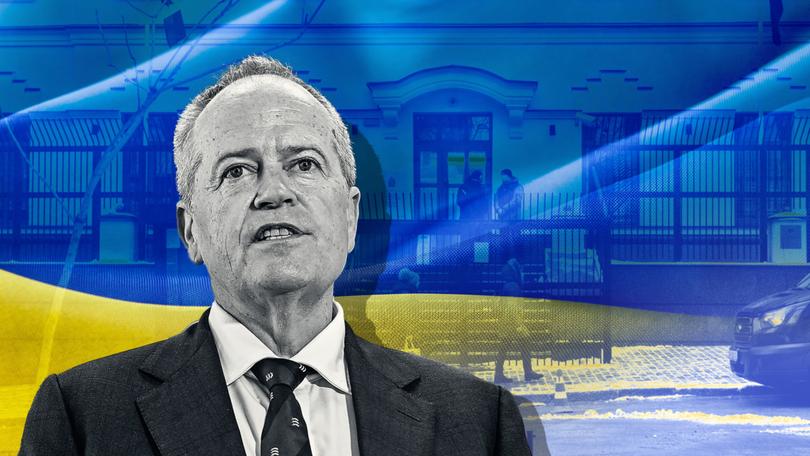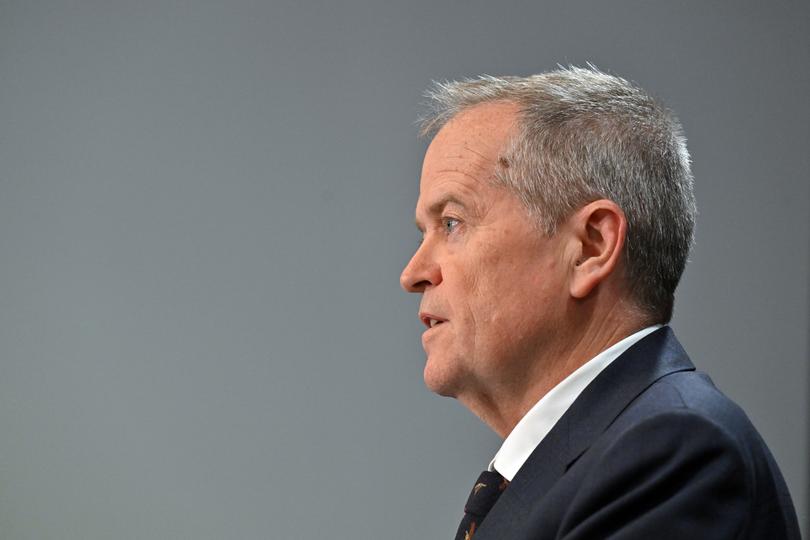Bill Shorten on Australia’s closed embassy in Ukraine: ‘Probably’ better if it was opened
Former Labor Leader Bill Shorten’s admission comes six months on from the closure of the Australian embassy in Ukraine.

Former Labor Leader Bill Shorten has said it ‘probably’ would have been better if the Australian Government reopened its embassy in Kyiv six months ago.
Mr Shorten, who represented Australia at the recent Summit on Peace in Ukraine in his capacity as the former opposition leader and Federal Minister for the National Disability Insurance Scheme, also said more Australian support for Ukraine would be forthcoming and would be for the long-term.
Australia has kept its embassy in Kyiv shut, despite most allies reopening their diplomatic postings in a show of solidarity for Ukraine, which is battling to repel Russian invaders from its borders.
Sign up to The Nightly's newsletters.
Get the first look at the digital newspaper, curated daily stories and breaking headlines delivered to your inbox.
By continuing you agree to our Terms and Privacy Policy.Asked on the Bourke & Ryan podcast why the embassy remained shut when others had returned, Mr Shorten cited bureaucratic advice from the Department of Foreign Affairs.
“DFAT had a view about the safety of staff but it’s a war zone — so I’m sure we’re there working on it,” he said.
Asked if he agreed with the advice, he said he would not contradict government policy.
“But sure, I can read and I can write and I can listen,” he said.
“So I can understand the point you’re making.”
He added that the issue was under consideration.
“I don’t think there’s never been a desire not to have the embassy open,” he said.
“Would it be good if it was open six months ago? Probably.”
“But I know that’s under consideration.”
The Australian retired major general Mick Ryan who has travelled to Ukraine frequently since Vladimir Putin’s full-scale invasion told Mr Shorten that the issue was regularly raised with him during his visits.
“Every time I go I keep getting asked, ‘When’s Australia reopening its embassy,’” he said.
“Because it is a really defining symbol of support.
“But it’s also a great way to help Australians there and learn from Ukrainians.”
The opposition’s foreign affairs spokesman Simon Birmingham said even ministers could no longer defend the policy.
“The Albanese Government still pays rent to Canada for space in an embassy that Canada reopened for their own diplomats,” he told The Nightly.
“If Canada can do so with appropriate safety, along with 83 other nations from Indonesia to Ireland, it seems inconceivable that Australia cannot find a way to do so.
“This isn’t just about symbolism but also ensuring that Australia receives the best possible intelligence and advice.
“When senior Labor ministers like Bill Shorten can’t even bring themselves to defend the decision, it is surely time for Anthony Albanese to tell Penny Wong and DFAT to find a way to reopen our embassy.”

Ukraine is attempting to repel Russian invaders from its borders but has been battling to shore up support from its Western backers as the war has progressed, including from its main supporters, the United States, which belatedly passed through Congress new military aid.
Australia’s contributions have been subjected to criticism, with the Albanese government overseeing a decline in military aid, despite high public support for continuing to back Ukraine.
The Keil Institute’s tracker of Ukraine aid shows Australia has slumped to 36th place out of 41 countries, beating only China, India, Taiwan, Turkey and New Zealand in contributing just 0.05 per cent of its GDP to Ukraine, despite recording budget surplus, in part bolstered by the war in Ukraine’s effect on commodity prices.
Questioned about Australia’s commitments, Mr Shorten said: “The government knows that we have to provide more ongoing assistance.”
He said one way could be by offering Ukraine help to develop its healthcare systems for the hundreds of thousands wounded in the war.
“They told me that it [there are now] three million people with disabilities [in Ukraine],” he said.
“Now some of that could have been traffic and accidents and what have you but they did talk to us about their needs in terms of helping rehabilitate Ukrainian men and women, so they can be productive in the workforce, so they can help go through their trauma and come out the other side.
“I had those discussions with them both at the UN – the international disability conference – and again, in Switzerland at the conference there.
”So I think there’s something there to think about but it’ll be administered through DFAT.
“But yeah, I do get that there’s interest in Ukraine for how else we can assist and I know there’s interest in Australia in how we can do the best we can.”
The Lowy Institute’s 2024 Poll found that around three-quarters per cent of Australians support reopening the embassy in Kyiv and providing military assistance.
Mr Shorten said Australians had a stake in the outcome of the Ukraine war, because if the Ukrainians won, that would help secure our region.
“If Ukraine are successful in running the Russians off their soil, skies and waters then that helps us in our region, too,” he said.
“That helps everyone everywhere.”
Mr Shorten said he volunteered to go to Switzerland for its Summit on Peace in Ukraine earlier this month when it emerged that the concurrent visit by Chinese Premier Li Qiang to Australia would keep Prime Minister Anthony Albanese, Foreign Minister Penny Wong and Defence Minister Richard Marles at home.
The Australian government waited until after Li Qiang had cleared Australian airspace before releasing a statement condemning China’s actions against the Philippines in the South China Sea.
Video released by the Philippines Armed Forces showed the Chinese Coast Guard surrounding, towing, ramming, and slashing of Filipino naval boats in the South China Sea.
It was the latest in a string of dangerous acts by the Chinese around the Second Thomas Shoal which China is trying to control, in defiance of an international ruling that said China had no claim to the area.
Mr Shorten said he did not know why China thought it was achieving with its bullying tactics.
“Bullying tactics ultimately don’t help China,” he said.
“I don’t know what China’s trying to do, why would you do it?
“Because … all you’re going to do is get the Filipino spirit up.”

